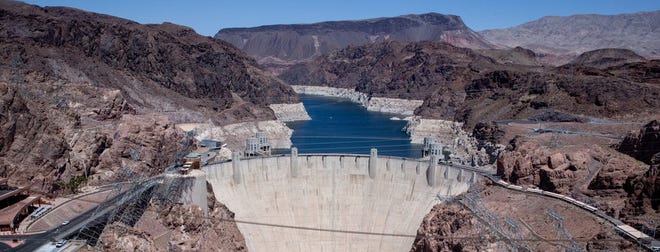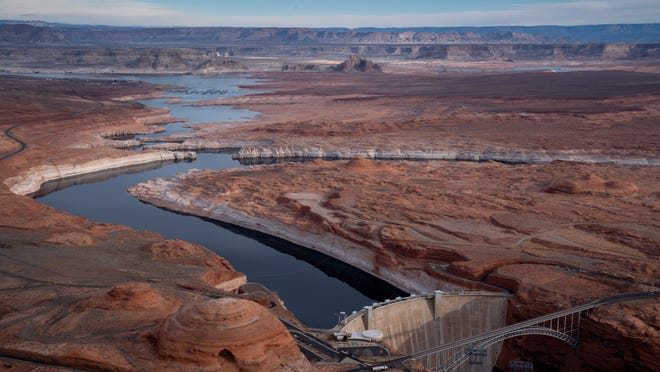The federal government will impose deeper cuts on the drought-stricken Colorado River, officials said on Tuesday, reducing water deliveries to Arizona and Nevada starting in January.
The Bureau of Reclamation announced what it called “urgent action” as water levels in the river’s two largest reservoirs continue to drop. Under the steps outlined Tuesday, Arizona will lose 592,000 acre-feet of its river allocation in 2023, which represents 21% of its usual delivery. That’s an increase of 80,000 acre-feet from the 2022 cuts.
Nevada will give up 25,000 acre-feet, about 8% of its allocation, and Mexico’s share will be cut by 104,000 acre-feet, or 7% of its allocation. California will not lose any of its share under the blueprint released Tuesday.
The moves are meant to protect two major dams from structural damage and the ability to generate electric power.
A PIPE DREAM, OR A POSSIBILITY? Water experts debate 1,500-mile aqueduct from Cajun Country to Lake Powell.
“Prolonged drought is one of the most profound issues facing the U.S. today,” said Tommy Beaudreau, assistant Interior secretary.
Arizona’s water managers suggested the plan was not enough and put too much of the burden on the Central Arizona Project, despite calls from the federal government to reduce water consumption across the river basin.
“It is unacceptable for Arizona to continue to carry a disproportionate burden of reductions for the benefit of others who have not contributed,” Tom Buschatzke, director of the state’s water resources department, and Ted Cooke, general manager of the CAP, said in a joint statement.
They said a proposal put forth by Arizona was rejected.
CLIMATE POINT: Subscribe to USA TODAY’s free weekly newsletter on climate change, the environment and the weather.
WATER WORRIES:Taps have run dry in a major Mexico city for months. A similar water crisis looms in the U.S., experts say.
Federal officials acknowledged the urgency of the situation.
“Our reservoirs are declining rapidly,” said Tanya Trujillo, assistant secretary of the Interior Department for water and science.
She said all users have the responsibility to ensure the water is used responsibly. Trujillo said that new funding authorized without prompt actions now, the Colorado River and the 40 million people who depend on it will face an uncertain future.
The Southern Nevada Water Authority echoed Arizona officials.
Secretary-general of the U.N.:These five steps will help us kick our fossil fuel addiction and save the planet
“The Colorado River cannot provide enough water for the current level of use,” said John Entsminger, the authority’s general manager. “The magnitude of the problem is so large that every single water user in every single sector must contribute solutions to this problem regardless of the priority system.”
Entsminger suggested several actions, including eliminating wasteful and antiquated water use, and eliminating lawns.
Contributing: Brandon Loomis, Arizona Republic.



